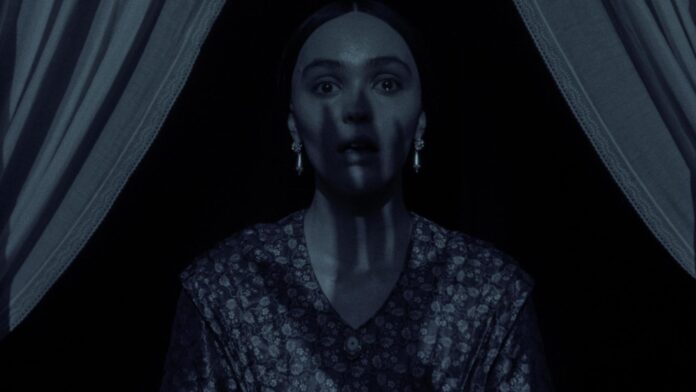Robert Eggers’ Nosferatu is a bit of a paradox. Hindered by its uneven pace and predictable plot – an aspect not totally excused by its constraints as a remake – the film can be an arduous watch at times. And yet, due to its excellent cast, wonderful cinematography, and solid screenplay, Nosferatu still manages to be one of 2024’s most enthralling horror films.
Nosferatu initially captivates by way of its striking imagery and impressive use of sound. The soft, sometimes muted lighting and historically-themed clothing alludes to a cold winter in 1830’s Germany. That said, it isn’t until estate agent Thomas Hutter (Nicholas Hoult) is sent to Transylvania to meet with Count Orlok/Nosferatu (Bill Skarsgård) that things take a chilling turn. Shadows in a densely wooded area seem to stretch far beyond their typical reach. Ominous music is eventually disrupted by an eerie silence. Lingering shots of a tree lined path feel oppressive as branches envelop the road, blocking out the sun. And the loud rhythmic thumping of hooves disturbs long before a ghastly, horse-drawn carriage comes into view. Essentially, Eggers’ deliberate style of shooting during the journey to Orlok’s castle succeeds in building an unsettling amount of tension.
This treatment is carried through much of Nosferatu’s runtime. Nearly devoid of jump scares, a few violent encounters notwithstanding, it’s the prolonged sense of impending doom that frightens. The film’s foreboding visuals and scary sounds help in that regard. As do the circumstances its protagonists often find themselves in. The inevitable outcome of Hutter’s meeting with the count is readily apparent. Everything about Orlok’s commanding presence and ancient, guttural sounding voice screams “run for your life”. But because Hutter is naive to the danger he’s in, we are forced to uncomfortably sit and watch him get duped by the count.
The notion that there’s a looming threat held just over the horizon colors every moment. It would all be exhausting if not for some humorous dialogue and brief moments of bloodshed; a shocking death often acts as a climatic event, resulting in a reprieve of sorts before the tension ramps back up. It’s this balancing act that makes Nosferatu feel like the nightmare-inducing film it’s meant to be. And that’s to say nothing of the amazing acting on display, the standout being Lily-Rose Depp’s riveting depiction of Hutter’s wife Ellen.
Tormented by dark premonitions at night and violent seizures by day, Ellen struggles to maintain her sanity. She knows that something evil is on the way but because of her disposition, which leads others to believe that she needs medical treatment as opposed to something more supernatural, she’s unable to convince anyone of the coming danger. Her situation is maddening, something that is perfectly reflected in Depp’s convincing performance. This is especially true when playing opposite Hoult – one of her scenes is so disturbing that it nearly rivals Isabelle Adjani’s subway scene in Possession (1981). Hoult also does a great job playing the gullible Hutter. His soft but stern tone when confronted by Depp mirrors Hutter’s desire to provide for his wife amidst an uneasy period in their marriage. Hutter doesn’t want to downplay her feelings but his skepticism (at first) prevents him from altering his ill-fated path. The eventual turn from scared estate agent to brave protector is believable given how well Hoult plays a loving husband.
Aaron Taylor-Johnson and Willem Dafoe offer strong performances as Hutter’s wealthy friend Friedrich Harding and occult expert Professor Albin Eberhart Von Franz, respectively. They both charm whenever on screen, with Dafoe stealing most scenes thanks to some well-placed humor. Skarsgård’s Orlok is downright menacing. His deceptively slow movements, pointed line delivery, and imposing presence – which is helped by some solid practical/special effects – conjures up an especially memorable monster. Outside of a few key moments as Pennywise, this is Skarsgård’s scariest role to date.
Though Nosferatu has a lot going for it, there are some sticking points. For one, it’s predictable to a fault. Some of it is fine, considering how well certain scenes play out, but there are a few key moments that are dulled by how formulaic they feel. Even portions of the film that were created specifically for this version of Nosferatu suffer from this. Pacing also suffers towards the latter parts of the film, where the heaps of expository chatter are held. While it was always great to hear Dafoe berate someone for not believing in vampires, these segments seem to drag things down. Ironically, the pacing slowly drains the film of its tension like Orlok does when feeding on a helpless victim. This makes knowing what’s going to happen harder to digest as one has to sit through these moments without the benefit of being afraid.
Nosferatu is an outstanding horror film. Part period piece, part fever dream, it evokes a palpable sense of dread while telling a familiar, yet engrossing tale. There are some pacing issues and the predictable nature of the plot does weaken otherwise impactful moments. But Nosferatu’s strengths – especially its talented cast and brilliant cinematography – certainly outweigh its weaknesses. And with stand-out performances from Depp and Skarsgård, it’s easily one of the best films released in 2024.
REVIEW SCORE: 4.5/5

